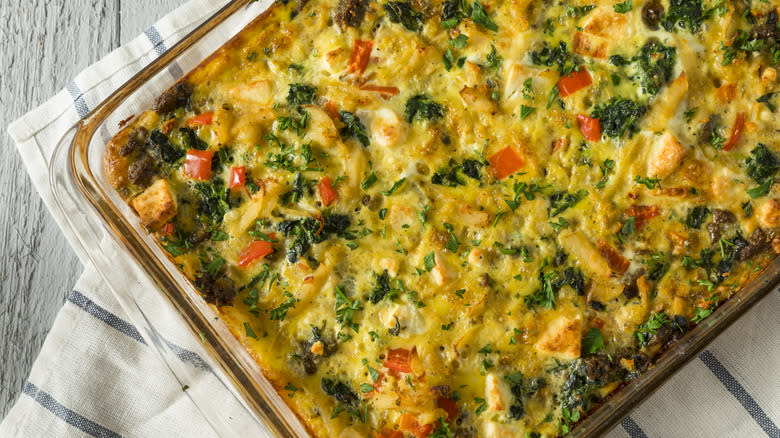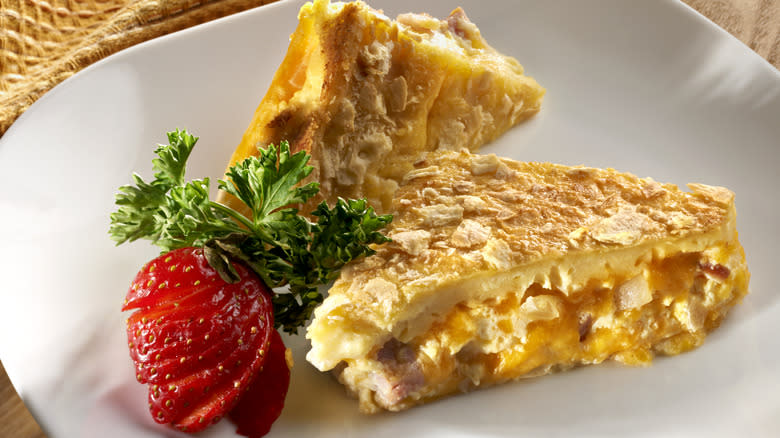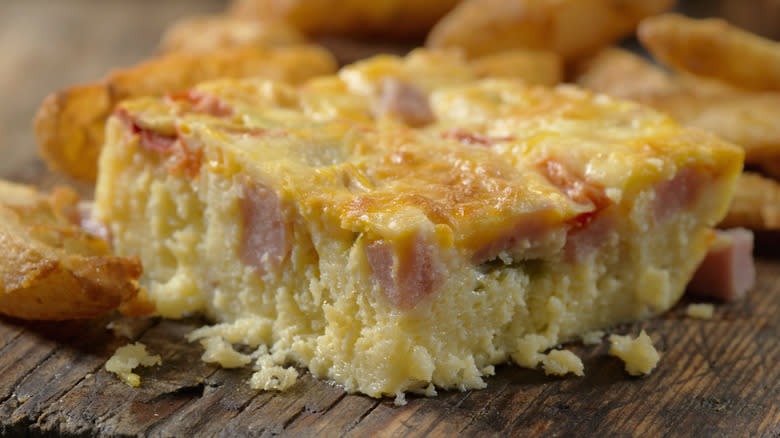Is It Better To Freeze Egg Casserole Before Or After Baking?

Preparing a breakfast casserole with sausage and egg can be a great way to save some time when preparing breakfast in the morning, especially if you're feeding a crowd. You can simply prepare the casserole as normal, then cover and freeze the dish. But if you are preparing an egg casserole ahead of time, you might wonder if it's best to freeze before baking or to bake first and reheat in the morning.
While both methods can work, the best method depends on the casserole's ingredients. If you pre-cook your ingredients before adding them to the casserole dish, it may be best to freeze it before baking. Then, when you're ready to eat the meal, you can allow the casserole to defrost in the fridge overnight and bake it in the morning. This option may even help to give the dish a freshly cooked feel since it will preserve the texture of the ingredients until they're cooked.
But some ingredients, like raw meat, may not freeze well in the dish — and you'll certainly want to make sure not to eat raw meat. In these cases, it may be best to cook the casserole before freezing.
Read more: The 20 Best Egg Brands, Ranked
Some Ingredients Require Cooking First

The ingredients that you add to your casserole will dictate how it's frozen, and some require one method versus the other. In general, freezing your casserole before baking may yield better results with the dish's texture. But any casserole that has raw meat — like uncooked bacon or breakfast sausage — should be fully cooked before freezing. Additionally, if your casserole contains potatoes, you may want to make sure they're cooked before freezing. Uncooked potatoes can retain a lot of moisture, which could cause a mushy texture as the dish thaws.
Eggs freeze best when they're whisked together first — and they can last for a while in the freezer. So, if you're fully assembling your egg-based casserole, make sure that both the yolks and whites are whisked together. Otherwise, the yolks can take on a gummy texture after defrosting — though a pinch of salt mixed in may help to remedy this. If your egg casserole omits raw meats and potatoes, you may want to freeze the dish uncooked to preserve the texture of the eggs. After they've been frozen, defrosted, and reheated, pre-cooked eggs may take on a slightly different texture from when they're freshly cooked — an issue that can be prevented by freezing before cooking.
How To Freeze An Egg Casserole

Regardless of whether you cook your casserole before freezing, you'll want to make sure you freeze it right. If it's cooked, make sure it's completely cooled to room temperature first. Take your casserole (cooked or uncooked) and cover the dish so that it's airtight. This will help prevent the dish from taking on any unwanted tastes or smells from other items in the freezer. Once frozen, your egg casserole can stay in the freezer for around two months. Beyond that, the texture of the ingredients may be a little different after defrosting and heating.
When you're ready to eat the casserole, simply defrost the dish in the fridge overnight and reheat it in the morning. For an uncooked casserole, add a little extra cooking time to what the recipe's instructions suggest. When reheating a cooked casserole, you'll want to make sure that the dish's internal temperature is high enough once it's been reheated. In both cases, cooked egg dishes should reach an internal temperature of 160 degrees Fahrenheit, according to the USDA.
Read the original article on Daily Meal.

 Yahoo Finance
Yahoo Finance 